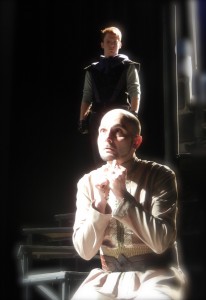A look inside the famous, troubled character of Hamlet
The scene is 17th century England; a man named Shakespeare sits down at a table with quill in hand, an ink jar resting nearby. A small flame from a candle shines on the parchment paper.
Dipping his quill into the ink, Shakespeare begins to write about a protagonist named Hamlet.

But who is Hamlet, and why does Shakespeare write about him? How is Hamlet still relevant in today’s ever-changing world?
When asked about “Hamlet,” most people could probably recite the famous quote, “To be or not to be, that is the question,” but not much more than that.
Mitch Donahue, theater junior, plays Hamlet in the upcoming production of “Hamlet.”
Donahue said Hamlet is the Prince of Denmark, who is intelligent and plays being insane.
“There are a couple of times in the play where he’s actually mad,” Donahue said. “I think he’s messing with everyone. For lack of better terms, he’s a jackass.”
Gerry Rose, professional actor and a skilled swordsman at the Frazier History Museum in Louisville plays Claudius, Hamlet’s uncle.
“I think you always have to look at the interpretation you are taking,” Rose said. “I’m also the fight director, so as I’m creating the fight, I have to think about exactly who I’m portraying. What is Hamlet’s character? How would he go about this fight? Would he cheat? Because those are the traits that really tell you how to go about establishing who that character really is.”
Rose said Hamlet does not cheat and is unraveling a mystery while trying to be a good son.
“I see strong nobility in Hamlet, especially in the way Mitch is portraying him,” Rose said. “You constantly see him strive to be noble. You see him always trying to do the right thing and even once the ghost reveals the truth to him, he still is playing the role to appease others, his mother and the kingdom.”
Rose said he sees Hamlet as a highly character, who is put in the worst situation you can imagine and his madness is really him losing his mind.
Daniel Hill, professor of theater and the director of “Hamlet” said that Hamlet is extremely smart.
Hamlet does not think too quickly or make rash decisions and he thinks things through, Hill said.
“The ghost reveals itself to Hamlet and tells him what is really going on,” Hill said. “Hamlet doesn’t just go and do what the ghost wants him to do. He has to figure things out. He’s got to find a way.”
Hamlet is very methodical in everything he does, Hill said. He is a young, smart, handsome, quick-witted and a very precise person.
“He’s got all the traits that make up a great king,” Hill said.
Rose said Hamlet is just the opposite of Claudius.
“I think when you really look at the characters of Hamlet and Claudius you can see the juxtaposition,” Rose said. “You can see how Claudius’ emotion is controlling his way. He’s not thinking about what he says. It just comes out.”
Rose said there are times in the play when Hamlet is emotional and then divine intervention comes into play.
“As far as the wit goes, I would like to highlight the grave digger’s scene,” Rose said. “You have this great variation of rapid fire exchanges, then thought, then rapid fire, thought. You can see Hamlet’s prowess, how he wants to engage in this witty banter, but he is also up to a whole lot more.”
Hill said Hamlet is very keen and his perception is very wide.
‘“What an ass am I? When this player here can act out anything and I have all this fire inside of me’?” Hill said, quoting “Hamlet.”
‘“I know he killed my father. My father came back and told me and I still haven’t done it.’ So, even though he knows he should have killed him already, he has tunnel vision. He is trying to find out what the right way is. What is the right thing to do, which all goes back to nobility.”
Hill said Shakespeare’s plays still resonate in today’s world because all the ingredients that make up “Hamlet” still exist in today’s world— greed, hope, power, and deception.
By TINA REED
Staff
tinkreed@ius.edu




